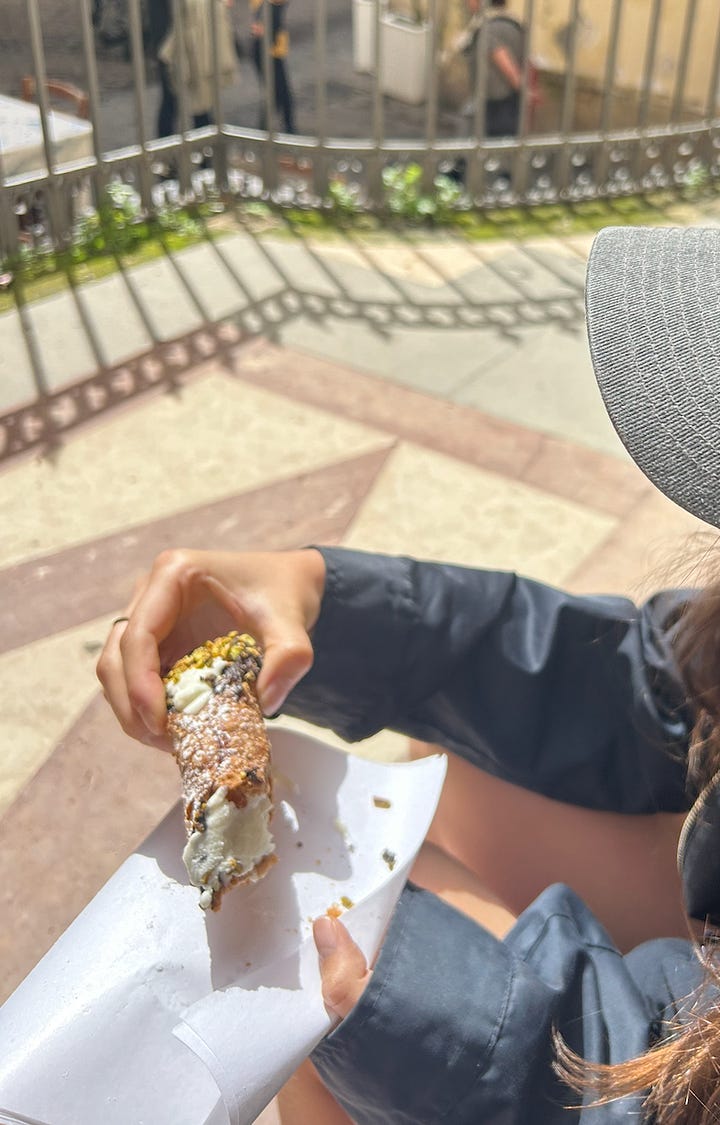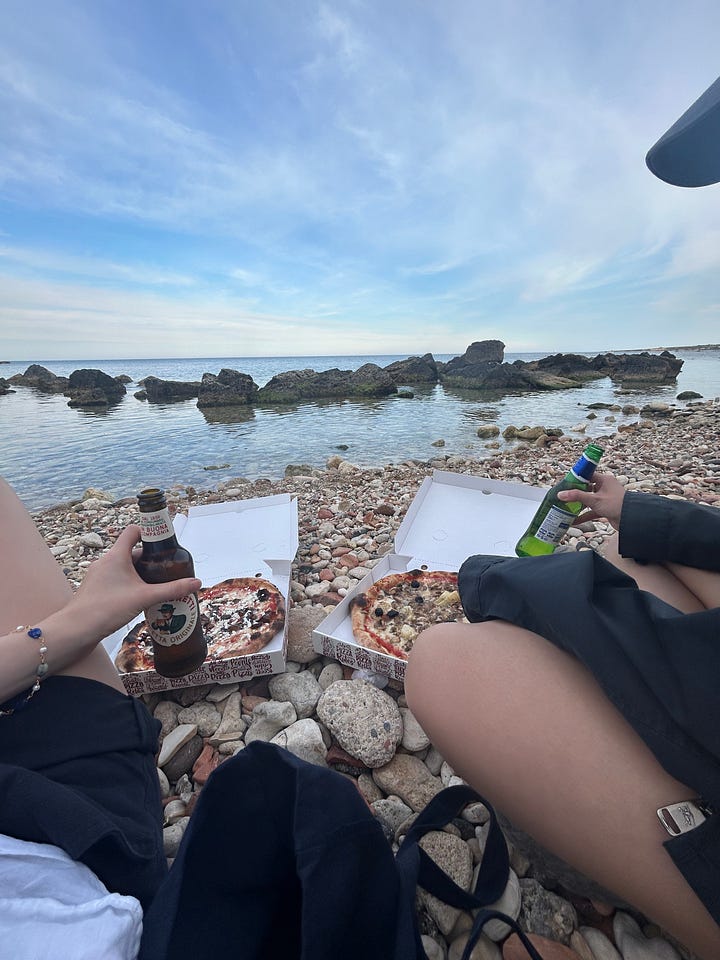how to have a body in summer
what would summer look like if you enjoyed it with your whole body?
As spring announces itself triumphantly with clear skies and fresh blossoms, I’ve been caught in a current I thought I’d learned to swim against.
“I’m doing summer in Sorrento,” the woman in front of me says to her friend as we queue at the café, “So I won’t have anything.” The bakery’s weekend special is a rhubarb and raspberry danish, shiny fresh pink with a circlet of almonds and icing sugar. “But don’t let me stop you.” Both women order iced Americanos, no milk, no sugar. I bite into the soft flakey pastry on my way to meet an old co-worker in London Fields, and when I arrive she says, in tones of startling normalcy, like she’s commenting on the weather, “I hate my body today.” I get back from a run and while I’m stretching in the sunlight, I watch a TikTok where a girl explains that “running won’t make you skinny.”
And now I’m on a beach in Sicily, small pebbles and water the colour of seaglass, and the sun is a warm golden buzz above our heads, and I’m drinking thick apricot juice and trying to read a book about love and tragedy and summer, and all I can think about is my body.
The thoughts hang damp and unpleasant in the air, like washing that refuses to dry. They are the same uninteresting bargainings and promises which flapped wetly in my head when I was fourteen. “Maybe if I…”, “I could start…”, “What if I stopped…”. I shift uncomfortably on my towel, stand up and walk slowly into the pure green sea. The water is cold and clean. It insists itself upon my skin.
The sea dances with sunshine. Everything I try to tell myself comes out like an old t-shirt with faded slogans that no one takes seriously anymore. Every body is a bikini body. You are more than your body. The beauty industry wants you to hate yourself.
When did these words start sounding so tired? They seem trite now, relics of our adolescence, even though I know they’re still true. Maybe we’ve heard them too many times.
I know that one way out is to disconnect entirely. To disengage and pretend you have no physical form at all. I thought getting in the water would feel like that, providing a sense of distance from my physical self. But swimming further out now, I realise: I can’t forget my body. Not out here, and not back on the shore.
Because summer is body. It’s not just that I’m wearing less this time of year. It’s that summer is about experiencing and savouring: the heat, the ice cream, the water, the breeze. There are no layers to shroud me from sensation. I sweat and swim and dance and run and eat and drink and lie very, very still. I feel and I feel and I feel. How can I forget my body when it’s almost summer?
In the absence of forgetting, I’ve been trying to remember. When I was little, my summer dresses were made for running and jumping and dancing. I was like a child in a Joaquín Sorolla beach painting, the ones you come across in a dark art gallery – where, just for a moment, it’s summer forever. I used to eat peaches in the sea because they were so juicy. Or I’d be so engrossed in an ice-cream that I wouldn’t notice it running down my wrists in sweet melted rivers. I sought out pleasure without thinking about it. There was no separation between ‘body’ and ‘me’. There’s this Wallace Stevens poem about a bowl of peaches, which begins: “With my whole body I taste these peaches / I touch them and smell them”. Is there a way back into that wholeness?
What would summer look like if I enjoyed it with my whole body?
i. taste
The essayist and gourmet M. F. K. Fisher said that whenever she was writing about hunger, what she was really doing was writing about love. “We must eat,” she wrote. “If, in the face of that dread fact, we can find other nourishment, and tolerance and compassion for it, we’ll be no less full of human dignity.”




In Sicily, where I grew up and where I’m writing this from, every house is strung with sun-drying tomatoes and fierce rasping chillies and papery garlic hanging from terrace rafters. Inside you’ll find an enormous pot of something, and bread, and olive oil, and little soft almond-scented biscuits. Diet culture exists here, but there is also an entrenched idea that eating well is a universal right. In the churches and art galleries you’ll find bodies of all kinds, made from marble so well-sculpted you’re sure their skin will be soft and warm to the touch, or painted so lovingly that you forget there’s such a thing as hating flesh. On the beaches, people of every age and body type strip off in the sunshine.
Here, food isn’t just a communal experience: it’s a communion. In Joseph O’Connor’s novel, My Father’s House, an Italian character is asked whether he believes in God, and replies that he “believed in risotto al radiocchio e Gorgonzola with a glass of something fragrant and one’s friends”. “For him,” O’Connor writes, “there was no holier word in any language than ‘mangiamo’”. Let’s eat!, is how we would say it in English, but I love the layers of meaning built into this single word, the marrying of eating and together as if, conceptually, they were inextricable.
This week, R. and I walk through the market and buy thick-skinned oranges and shocking pink prawns and cool thin slices of prosciutto. The man at the fish stall gives us a spray of fresh parsley, so delicate and so abundant you could imagine a bride carrying it to the altar, and charges us nothing. Everyone is gently invested in ensuring we eat well. We sit in the sunshine, our backs leaning against the door of a disused church, and pass a cannoli back and forth, filled with fresh ricotta and dipped in bright green pistachio kernels.
We lick cream off our fingers and talk about everything we’re going to do with our lives. The wooden church door is warm against my back. Do I believe in God? This holiday reminds me that some things are holy, no matter what: nourishment and abundance and sharing good things with people I love.
ii. touch
The first warm day of the year always comes, and everybody always underdresses slightly, huddling and cold in the park after the sun goes down. Our summer wardrobes are full of hope.
I’m always going to be the girl who unpacks her summer clothes too early. On the Overground home from London Fields in early April, I shiver in a blue cotton dress and look down at my body. Last night, my flatmate told me that reputable plastic surgeons give prospective patients a questionnaire: How many hours a day do you think about your appearance? “And most people lie,” she explained, “They say four hours a day, but really it’s more.” I wonder what I’d say if I was lying, and what I’d say if I was being honest.
I’ll admit it: I do think about my appearance a lot. I like deciding what I’m going to wear next, and I like running my hands down the aisles of a charity shop, and I like putting colours together, and I like deciding what shade of blush to blur into my cheeks, and I like my new shoes, and I like brushing my hair, and I like borrowing my friends’ clothes and seeing them wear mine. I spend the months leading up to summer searching for a “perfect summer dress”, an apotheosis which does not exist.
But it’s so easy to slip from interest to obsession. When does enjoying getting ready in the morning become something else? I stand in changing rooms and wonder about the difference between caring and hyperfixating. How do you dress for yourself? What would it mean to dress “with my whole body”?
Mary Quant, who invented the mini skirt, said that she only made clothes “in which you could move, in which you could run and jump”. Experience, in Quant’s world, was as much part of a piece of clothing as its fabric and cut: she called the mini skirt “self indulgent, optimistic”. Vivienne Westwood also spoke a lot about the subjective experience of the wearer: she said that her clothes are always “lively-looking” because they move with the body. For all her corsets and tiny skirts and open blouses, Westwood cared about the way clothes felt: “The thing about them,” she once said, “is that you can wear them without caring at all, and they are just working for you all the time”.
So when I’m looking for my new summer dress, I try to focus on feeling. The fabric which feels nicest when it brushes my thighs as I walk or dance. The fit which embraces or caresses my hips and legs and breasts. The colours that make me happy when I look down or catch a glimpse of them in the mirror: lemon yellow, seaglass green, faded watermelon, that sunburst of red at the centre of a ripe peach.
iii. wholeness
My body knows things that I don’t. When I swim, I don’t think, I just swim. I crave water when I’ve been in the sun all day, and my heart speeds up just before I kiss someone. The writer Hélène Cixous said that it was necessary for women to write with their bodies: to let the body “articulate the profusion of meanings that run in every direction”. This act of centering the body, would “give her back her goods, her pleasures, her organs, her immense bodily territories”. As with most advice for making art, I think this extends to living life. What would it mean to actually listen to your body? To let it articulate what you want? To really inhabit those pleasures, desires, sensations?
I want to laugh and eat strawberry ice-cream and feel silk against my thighs and never ever ever question this body that allows me to do and to feel so much. But there are no easy solutions. Tenderness isn’t always in your grasp.
But no matter what, summer keeps coming, and my body keeps wanting. The poet Joy Sullivan writes: “Healing, I think, is mostly just the body not abandoning the body… To listen to the skin’s spined senses, nosing you in a new direction.”
Anyway, I’ve only been in this body for twenty-six years. That’s not even twenty-six summers yet. And I could live another seventy, eighty, ninety summers. So why wouldn’t I try my hardest to be very tender with myself?









I always love your writing, Cat but you have an especially tender and beautiful way of capturing the feeling of summer. 🍑
this was one of my favourite reads. period. i will keep it saved, and share it with my friends. you captured sicily’s essence (as someone from a sicilian family) with as much beauty as you spoke to the soul of every woman. thank you!